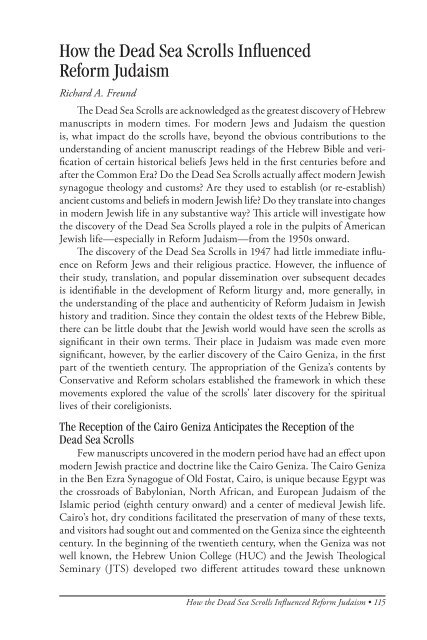The American Jewish Archives Journal, Volume LXI 2009, Number 1
The American Jewish Archives Journal, Volume LXI 2009, Number 1
The American Jewish Archives Journal, Volume LXI 2009, Number 1
You also want an ePaper? Increase the reach of your titles
YUMPU automatically turns print PDFs into web optimized ePapers that Google loves.
How the Dead Sea Scrolls Influenced<br />
Reform Judaism<br />
Richard A. Freund<br />
<strong>The</strong> Dead Sea Scrolls are acknowledged as the greatest discovery of Hebrew<br />
manuscripts in modern times. For modern Jews and Judaism the question<br />
is, what impact do the scrolls have, beyond the obvious contributions to the<br />
understanding of ancient manuscript readings of the Hebrew Bible and verification<br />
of certain historical beliefs Jews held in the first centuries before and<br />
after the Common Era? Do the Dead Sea Scrolls actually affect modern <strong>Jewish</strong><br />
synagogue theology and customs? Are they used to establish (or re-establish)<br />
ancient customs and beliefs in modern <strong>Jewish</strong> life? Do they translate into changes<br />
in modern <strong>Jewish</strong> life in any substantive way? This article will investigate how<br />
the discovery of the Dead Sea Scrolls played a role in the pulpits of <strong>American</strong><br />
<strong>Jewish</strong> life—especially in Reform Judaism—from the 1950s onward.<br />
<strong>The</strong> discovery of the Dead Sea Scrolls in 1947 had little immediate influence<br />
on Reform Jews and their religious practice. However, the influence of<br />
their study, translation, and popular dissemination over subsequent decades<br />
is identifiable in the development of Reform liturgy and, more generally, in<br />
the understanding of the place and authenticity of Reform Judaism in <strong>Jewish</strong><br />
history and tradition. Since they contain the oldest texts of the Hebrew Bible,<br />
there can be little doubt that the <strong>Jewish</strong> world would have seen the scrolls as<br />
significant in their own terms. <strong>The</strong>ir place in Judaism was made even more<br />
significant, however, by the earlier discovery of the Cairo Geniza, in the first<br />
part of the twentieth century. <strong>The</strong> appropriation of the Geniza’s contents by<br />
Conservative and Reform scholars established the framework in which these<br />
movements explored the value of the scrolls’ later discovery for the spiritual<br />
lives of their coreligionists.<br />
<strong>The</strong> Reception of the Cairo Geniza Anticipates the Reception of the<br />
Dead Sea Scrolls<br />
Few manuscripts uncovered in the modern period have had an effect upon<br />
modern <strong>Jewish</strong> practice and doctrine like the Cairo Geniza. <strong>The</strong> Cairo Geniza<br />
in the Ben Ezra Synagogue of Old Fostat, Cairo, is unique because Egypt was<br />
the crossroads of Babylonian, North African, and European Judaism of the<br />
Islamic period (eighth century onward) and a center of medieval <strong>Jewish</strong> life.<br />
Cairo’s hot, dry conditions facilitated the preservation of many of these texts,<br />
and visitors had sought out and commented on the Geniza since the eighteenth<br />
century. In the beginning of the twentieth century, when the Geniza was not<br />
well known, the Hebrew Union College (HUC) and the <strong>Jewish</strong> <strong>The</strong>ological<br />
Seminary (JTS) developed two different attitudes toward these unknown<br />
How the Dead Sea Scrolls Influenced Reform Judaism • 115

















